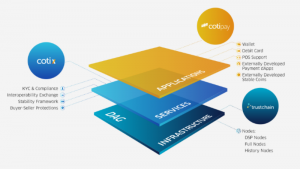

Shahaf Bar-Geffen, CEO of COTI, said: “Development of payment applications and stable coins is limited today due to the use of unsuitable blockchain. We are launching the world’s first protocol that is actually optimized for payments and stable coins, with a belief that developers and enterprises will build groundbreaking applications on our platform. Early traction proves that we have built a platform that is in real need.
“For cryptocurrencies to reach their true potential, they must become a cheaper, quicker and easier means of payment than they are currently. Unfortunately, any blockchains that rely on confirmations from miners will never be truly scalable. We need a system such as COTI that reevaluates the structure of blockchains. At COTI, we’ve not only built a digital currency, but an entire digital ecosystem based on an improved protocol. (In effect) COTI is doing for payment apps and stable coins what Ethereum did for dApps. This will set the standard for next-generation payment solutions and stable coins that is safe, easy to use, instant and cost-effective.”
Trustchain
COTI’s Trustchain includes proprietary technologies which enable developers and enterprises to build independent global scalable payments networks:
- based on DAG (Directed Acyclic Graph)
- issuing price-stable coins.
COTI says it has solved several major problems holding back the scalability of current cryptocurrencies and stable coins:
- speed
- cost
- energy consumption
- trust.
Performance
If COTI’s solution works as described it will be relevant to industries with combined turnovers estimated in the trillions of US$. Networks built on the Trustchain will be able to process tens of thousands of transactions per second (TPS).
This would stand in stark contrast to current blockchain solutions. The majority process only a few transactions per seconds and with a high cost per transaction.
COTI says it has already signed up:
- 80,000 users
- 5,000 merchants
- various enterprises
- developers of payment networks and point of service devices (among others).
Speed, energy/cost and the Trustnet alternative
Cryptocurrencies, such as Bitcoin, use blockchains which require confirmation of each transaction via solving difficult maths problems. Transactions necessarily:
- incur a costly ‘miner’s fee’
- can take hours to process
- consume prodigious energy (for the computational power necessary).
As a result, Bitcoin operations process around 2 TPS. In addition, such slow processing creates a dangerous and potentially unfair concentration where a few dedicated mining farms solve most bitcoin blocks and earn most Bitcoin rewards.
COTI has architected a new blockchain based on DAG (Directed Acyclic Graph) data structure. It calls this Trustchain. DAG is block-less blockchains. There are no miners or blocks.
Each new transaction validates two previous transactions being added to the ledger. In COTI’s Trustchain, with no miners or blocks, this enables near real-time and low-cost crediting of funds to another party’s wallet. Unlike Bitcoin, COTI is able to process tens of thousands TPS.
Not only that, as decribed above, removing miners on the Trustchain:
- reduces the use of computing power
- removes the dependence on massive energy consumption
- respects environmental responsibilities in the context of crypto-platforms.
Trust
On COTI’s Trustchain protocol, each participant receives a trust score to predict that participant’s trustworthiness on the network. Participants who consistently receive minimal or no complaints for their activity receive the higher positive scores. As a reward participants:
- incur lower fees for using Trustchain
- with spotless records will be charged zero fees by the system.
With such an incentive system in place, this encourages participants to conduct trustful and trustworthy transactions. Those who do not will pay increased fees.
Current blockchain-based payments can be untrustworthy (due to the fact that they are irreversible), because there is no buyer-seller protection in place to guarantee sellers will deliver on promises – once payment has been transferred. However, COTI replaces fiat’s lengthy and blockchain’s non-existent dispute resolution processes with a transparent and decentralised process.
Disputes resolve through a real jury of peers made up of COTI users, who are rewarded in COTI coins. In effect COTI’s approach to mediation involves harnessing an independent network of crowdsourced mediators to solve disputes fairly and efficiently.
Enterprise Times: what does this mean
COTI says it offers a blockchain platform:
- optimised for decentralised payments
- designed for use by merchants, governments, decentralised payment networks and stable coin issuers
- addressing identity, trust, stability, scalability and high transaction costs.
Where most blockchain platforms today optimise for dApps – and not for payments – Trustnet claims to be different – because it:
- provides the infrastructure and tools required for everyday transactional use
- exploits a DAG-based ledger to provide extreme scalability to process tens of thousands of transactions per second
- includes price stability mechanisms and low costs.
For Enterprise Times this (Trustchain) is by no means the first high-performance – as measured in TPS – blockchain platform. Others include: #MetaHash, Todo-Algorand and Zilliqa. None are proven in a commercial enterprise environment, at least to Enterprise Times.
In addition IBM has also announced a blockchain-based initiative called TrustChain. All very puzzling.


























